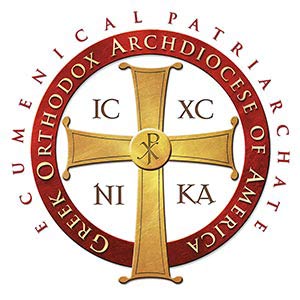Service Schedule
Saturday, March 7, 2020
3rd. Last Saturday of Souls
9:00 a.m. Orthros/10 a.m. Divine Liturgy
Sunday, March 8, 2020
Sunday of Orthodoxy
9:15 a.m. Orthros/10:15 a.m. Divine Liturgy
Wednesday, March 11, 2020
6:30 p.m. Pre-Sanctified Liturgy
7:30 p.m. Greek Dance Class
Thursday, March 12, 2020
6:30 p.m. Bible Study
Friday, March 13, 2020
7:00 p.m. 2nd. Salutations to the Theotokos
Sunday, March 15, 2020
Sunday of St. Gregory Palamas
9:15 a.m. Orthros/10:15 a.m. Divine Liturgy
Wednesday, March 18, 2020
6:30 p.m. Pre-Sanctified Liturgy
7:30 p.m. Greek Dancing Class
Thursday, March 19, 2020
6:30 p.m. Bible Study
Friday, March 20, 2020
7:00 p.m. 3rd. Salutations to the Theotokos
Sunday, March 22, 2020
Sunday of Holy Cross
9:15 a.m. Orthros/10:15 a.m. Divine Liturgy
Wednesday, March 25, 2020
Annunciation & Greek Independence Day
9:00 a.m. Orthros/10 a.m. Divine Liturgy
NO DANCE CLASS
Thursday, March 26, 2020
6:30 p.m. Bible Study
Friday, March 27, 2020
7:00 p.m. 4th. Salutations to the Theotokos
Sunday, March 29, 2020
Sunday of St. John Climacus
9:15 a.m. Orthros/10:15 a.m. Divine Liturgy
GREEK INDEPENDENCE DAY PARADE
Wednesday, April 1, 2020
6:30 p.m. Pre-Sanctified Liturgy
7:30 p.m. Greek Dance Class
Thursday, April 2, 2020
6:30 p.m. Bible Study (Last Bible Study till after Easter)
Friday, April 3, 2020
7:00 p.m. Akathist Hymn (Final Friday Service)
Sunday, April 5, 2020
Sunday of St. Mary of Egypt
9:15 a.m. Orthros/10:15 a.m. Divine Liturgy
Wednesday, April 8, 2020
6:30 p.m. Pre-Sanctified Liturgy
7:30 p.m. Greek Dance Class
Thursday, April 9, 2020
NO BIBLE STUDY
Saturday, April 11, 2020
Saturday of Lazarus
9:00 a.m. Orthros/10 a.m. Divine Liturgy
Great and Holy Week Schedule – ΜΕΓΑΛΗ ΕΒΔΟΜΑΣ ΠΑΣΧΑ
Sunday, April 12 - Palm Sunday - ΤΩΝ ΒΑÏΩΝ
9:00 Orthros/10:00 a.m. Divine Liturgy - ΘΕΙΑ ΛΕΙΤΟΥΡΓΙΑ
7:00 p.m. Service of the Bridegroom (Nymphios) – ΑΚΟΛΟΥΘΙΑ ΝΥΜΦΙΟΥ
Holy Monday, April 13 – ΜΕΓΑΛΗ ΔΕΥΤΕΡΑ
7:00 p.m. Service of the Bridegroom (Nymphios) - ΑΚΟΛΟΥΘΙΑ ΝΥΜΦΙΟΥ
Holy Tuesday, April 14 – ΜΕΓΑΛΗ ΤΡΙΤΗ
7:00 p.m. Service of the Bridegroom - ΑΚΟΛΟΥΘΙΑ ΝΥΜΦΙΟΥ
Hymn of Kassiani – ΤΟ ΤΡΟΠΑΡΙΟΝ ΤΗΣ ΚΑΣΣΙΑΝΗΣ
Holy Wednesday, April 15 – ΜΕΓΑΛΗ ΤΕΤΑΡΤΗ
7:00 p.m. Sacrament of Holy Unction – ΜΥΣΤΗΡΙΟΝ ΑΓΙΟΥ ΕΥΧΕΛΑΙΟΥ
Holy Thursday, April 16 – ΜΕΓΑΛΗ ΠΕΜΠΤΗ
9:00 a.m. Vesperial Liturgy of St. Basil the Great – ΕΣΠΕΡΙΝΟΣ ΚΑΙ Θ. ΛΕΙΤΟΥΡΓΙΑ ΜΕΓ. ΒΑΣΙΛΕΙΟΥ
7:00 p.m. Service of the Holy Passion of our Lord (Twelve Gospels) – 12 ΙΕΡΑ ΕΥΑΓΓΕΛΙΑ
Holy and Good Friday, April 17 – ΜΕΓΑΛΗ ΠΑΡΑΣΚΕΥΗ
3:30 p.m. The Royal Hours and Great Vespers (Apokathelosis) ΜΕΓΑΣ ΕΣΠΕΡΙΝΟΣ ΚΙΑ ΑΠΟΚΑΘΝΛΩΣΙΣ
7:00 p.m. Lamentations (Epitaphios) – ΕΠΙΤΑΦΙΟΥ ΘΡΗΝΟΥ
Holy Saturday, April 18 – ΜΕΓΑΛΗ ΣΑΒΒΑΤΟΝ
9:00 a.m. Divine Liturgy of St. Basil the Great – ΜΕΓΑΣ ΕΣΠΕΡΙΝΟΣ ΚΙΑ Θ. ΛΕΙΤΟΥΡΓΙΑ ΜΕΓ. ΒΑΣΙΛΕΙΟΥ
11:00 - 11:50 p.m. Holy Resurrection Matins – ΜΕΣΟΝΥΚΤΙΚΟΝ ΑΝΑΣΤΑΣΩΣ
12:00 - 12:20 a.m. The Triumphant Resurrection – ΙΕΡΑ ΤΕΛΕΤΗ ΑΝΑΣΤΑΣΕΩΣ ΚΑΙ ΟΡΘΡΟΣ ΑΓΙΟΥ ΠΑΣΧΑ
12:20 – 2:00 a.m. Divine Liturgy of the Resurrection – ΘΕΙΑ ΛΕΙΤΟΥΡΓΙΑ ΑΓΙΟΥ ΠΑΣΧΑ
Great and Holy Pascha Sunday, April 19 – ΚΥΡΙΑΚΗ ΑΓΙΟΥ ΠΑΣΧΑ
12 noon - Agape Vesper of Easter – ΜΕΓΑΣ ΕΣΠΕΡΙΝΟΣ ΑΓΙΟΥ ΠΑΣΧΑ (ΑΓΑΠΗ)


 His Eminence Archbishop Elpidophoros of America and the Most Reverend Members of the Holy Eparchial Synod of the Greek Orthodox Archdiocese of America, have issued guidelines to the Clergy and Laity of the Archdiocese to face the outbreak of the Coronavirus, Covid-19, that has spread throughout the world.
His Eminence Archbishop Elpidophoros of America and the Most Reverend Members of the Holy Eparchial Synod of the Greek Orthodox Archdiocese of America, have issued guidelines to the Clergy and Laity of the Archdiocese to face the outbreak of the Coronavirus, Covid-19, that has spread throughout the world.
 The appearance of the Covid-19 Pandemic (Coronavirus) throughout the world and in the United States has created fear, anxiety, and genuine concern. All of these need to be taken seriously and no one’s fears should be dismissed out of hand. Already, religious bodies are responding in similar ways, but ways that are not necessarily consistent. In order to assist the Faithful in their own response, this statement is meant to guide and inform us all.
The appearance of the Covid-19 Pandemic (Coronavirus) throughout the world and in the United States has created fear, anxiety, and genuine concern. All of these need to be taken seriously and no one’s fears should be dismissed out of hand. Already, religious bodies are responding in similar ways, but ways that are not necessarily consistent. In order to assist the Faithful in their own response, this statement is meant to guide and inform us all.
 NEW YORK – The summer of 2020 marks the 50th Anniversary of the extraordinary travel abroad Summer Program of the Greek Orthodox Archdiocese of America, Ionian Village.
IV 2020, has opened registration for summer 2020. All are encouraged to visit www.ionianvillage.org for more information and to register.
NEW YORK – The summer of 2020 marks the 50th Anniversary of the extraordinary travel abroad Summer Program of the Greek Orthodox Archdiocese of America, Ionian Village.
IV 2020, has opened registration for summer 2020. All are encouraged to visit www.ionianvillage.org for more information and to register.
 NEW YORK – On Wednesday, March 4, 2020, His Beatitude, Patriarch Irinej of Serbia visited the Archdiocese Headquarters. In his welcoming remarks, His Eminence Archbishop Elpidophoros of America expressed his joy in welcoming the Primate of the Orthodox Church of Serbia and highlighted the spirit of cooperation between the Churches, especially in the United States.
NEW YORK – On Wednesday, March 4, 2020, His Beatitude, Patriarch Irinej of Serbia visited the Archdiocese Headquarters. In his welcoming remarks, His Eminence Archbishop Elpidophoros of America expressed his joy in welcoming the Primate of the Orthodox Church of Serbia and highlighted the spirit of cooperation between the Churches, especially in the United States.